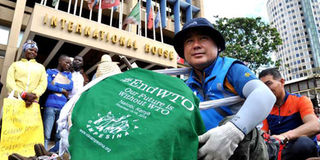Intrigues and disagreements define first WTO meet on African soil

Anti World Trade Organisation Crusaders protest in Nairobi Streets on December 17, 2015. PHOTO | GERALD ANDERSON | NATION MEDIA GROUP
What you need to know:
- On Friday night, the big five nations (The US, China, Brazil, EU and India) were locked in closed-door negotiations with Foreign Affairs CS Amina Mohammed, with the US refusing to budge on the matter of stopping subsidies for farmers.
- India’s Commerce minister Nirmala Sitharaman said together with its team at the WTO, India was working positively in all negotiations at the Friday closed door meeting.
The 10th ministerial WTO will be remembered because of the intrigues that took centre stage as the negotiations closed Friday.
As the talks began earlier in the week, African nations had strong hopes of winning the negotiations because the conference was hosted locally.
On Friday night, the big five nations (The US, China, Brazil, EU and India) were locked in closed-door negotiations with Foreign Affairs CS Amina Mohammed, with the US refusing to budge on the matter of stopping subsidies for farmers.
India’s Commerce minister Nirmala Sitharaman said together with its team at the WTO, India was working positively in all negotiations at the Friday closed door meeting.
“Last night’s negotiations continued till 3 am. India blocking WTO? I Disagree,” she said in a tweet ruling out speculations of differences between Africa and India on the negotiating table.
India was under pressure to have a positive outcome of the issue on agricultural subsidies.
Biraj Patnaik, the Principal Adviser to the Commissioners of the Supreme Court in India, told Sunday Nation that, “The Indian government is under pressure to please its over 600 million farmers, the government already lost elections in the state of Bihar, it will therefore work hard to get something positive for the farmers.”
He added that it is for that reason that India refused to ratify the Trade Facilitation Agreement (TFA) until the farm subsidies are cut.
As the closed door discussions continued, it appeared that Kenyan bloggers were influenced to thwart India’s efforts in the negotiations. The harsh tag, #IndiaBlocksTalks was most twitted with a statement of blame to India for delaying the talks that would benefit Africa.
“Sources from KICC telling me that India has blocked ongoing talks getting more info #IndiaBlocksTalks,” said one of the tweets.
It is only until yesterday morning that positive tweets were shared, this was one of them, “People are just sinking into #IndiaBlocksTalks ignorantly!!!. India is fighting a good fight for developing nations. #USBlocksTalks.”
A delegate present at the prolonged meeting told Sunday Nation that the US was applying its negotiating tactics at the table as India pinned it down with targets it had set to meet at the first Doha round in 2001.
“Several clauses were slotted in and thrown out again as a consensus on the tabled issues was not reached, it is then that the big five countries agreed on addressing aspects of the agricultural subsidies,’ said the delegate who did not want to be mentioned for fear of being accused of breaching WTO protocol.
He revealed that India lodged a strong protest against any move to eliminate farm export subsidies without safeguarding the interest of developing nations.
“This includes advancing work in all three pillars of agriculture, namely domestic support, market access and export competition, as well as non-agriculture market access,” the final WTO ministerial council text read.





